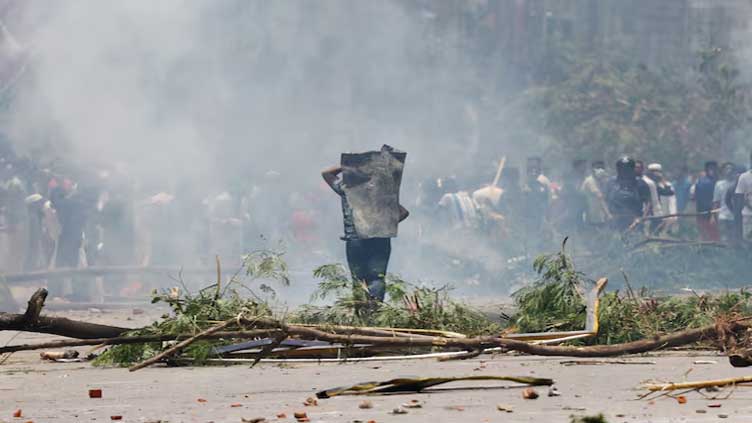Bangladesh police fire tear gas, sound grenades as protesters return to streets

World
Bangladesh police fire tear gas, sound grenades as protesters return to streets
DHAKA (Reuters) - Police in Bangladesh fired tear gas and lobbed sound grenades on Wednesday to scatter protesters marching to demonstrate against violence that killed at least 150 people this month during student-led agitation against job reservations.
The unrest is the biggest test facing Prime Minister Sheikh Hasina, 76, since she won a fourth straight term in January elections that were boycotted by the main opposition Bangladesh Nationalist Party and also marred by deadly protests.
Police said they had to use force when protesters in the northeastern district of Sylhet broke through barricades to head for the courts.
"We requested the protesters to move from the road, but they didn't listen and instead attacked the police, forcing us to disperse them with tear gas and stun grenades," said regional deputy commissioner Azbahar Ali Sheikh.
Dhaka, the capital, and the southern port city of Chittagong were among several places where police and protesters scuffled, domestic media said.
The number of casualties was not immediately clear, though the media reported some injuries, with some students detained.
Wednesday's nationwide "March for Justice" was called by the Students Against Discrimination group that was at the forefront of protests against quotas in government jobs.
Although the students had agreed to call off their protest after the Supreme Court scrapped most quotas on July 21, they turned out again to demonstrate against the deaths, arrests, and government intimidation in this month's violence.
The Bank of Japan surprised markets on Wednesday with a rate hike.
"We will also demand a United Nations investigation into the violence," Mohammad Mahin Sarkar, a coordinator of the movement, added in a statement.
International rights groups have condemned close to 10,000 arrests over the past two weeks on charges of involvement in clashes and destruction of government property.
At an event in Dhaka, Hasina said Bangladesh had appealed to the United Nations and various international bodies for help.
"We seek their assistance in conducting a proper investigation and ensuring punishment for those responsible," she added.
The European Union said it had postponed talks with Dhaka on a new cooperation pact to improve trade and economic and development ties because of the situation.
But a finance ministry official said the delay, until the first week of November, had been decided well before the recent violence.
"This delay was due to the U.N. General Assembly," the official, Uttam Kumar Karmaker, said in a statement.
In recent weeks, Bangladesh shut down the internet and sent the army to enforce a nationwide curfew as the protests spilled into widespread agitation since they began in universities and colleges in June.
Thousands were injured as security forces fired rubber bullets, and tear gas and lobbed sound grenades to disperse tens of thousands of protesters who flooded into the streets.
Hasina's government also said it was set to ban the main Islamic party, Jamaat-e-Islami, and its student wing, both of which Dhaka blames for the violence unleashed during the protests.
"For the sake of the country the decision has been made," Law Minister Anisul Huq told Reuters, adding that the ban was likely to be declared through an executive order on Wednesday.
Dhaka has set up a judicial inquiry to investigate the violence thoroughly, he said.
In a statement, Jamaat condemned the decision by the ruling alliance led by Hasina's Awami League as "illegal, extrajudicial and unconstitutional", without saying what action it would take.
"Using state machinery, they are playing a blame game against Jamaat and other opposition parties," said Shafiqur Rahman, chief of the party, which, along with the opposition, had denied the government's assertion that they stoked violence.
Jamaat was effectively barred from elections after a court said in 2013 that its registration as a political party conflicted with Bangladesh's secular constitution.
Rights groups and critics say Hasina has become increasingly autocratic during her last 15 years in power. The United Nations, global rights groups, the United States, and Britain criticised Dhaka's use of force against the demonstrators.


